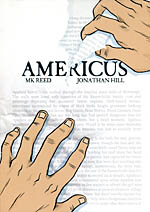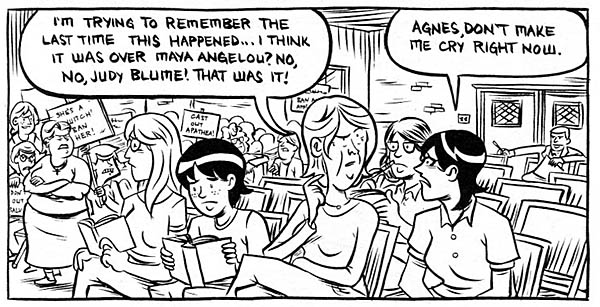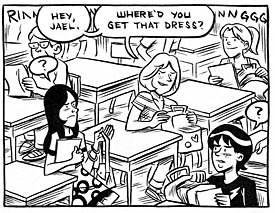 Written by MK Reed
Written by MK Reed
Art by Jonathan Hill
224 pages, black and white
Published by First Second Books
Americus is the kind of graphic novel that I wish wasn’t so timely. Centered around a teenager whose town is trying to ban his favorite fantasy book series, it’s the sort of story that plays out in the real world far too often. MK Reed and Jonathan Hill’s story is painful to read in that respect, but its lead in the form of Neil Barton is the kind of character who’s compelling enough that you’ll read all the way through just to see if he succeeds, not only in stopping the banning but also trying to get a better life for himself.
When I read the first chapter of Americus in Papercutter #7, I remember thinking that it was an enjoyable opening sequence to a larger story, but that a lot of my enjoyment would hinge on where the book went from there. On the whole, I think it succeeds. Neil is a traditional, familiar figure in both reality and fiction; the geeky outcast teen with few friends and in a setting that ranges from passively to actively hostile. And while I completely understand why it’s good to have a character with the deck seriously stacked against him, when the first two chapters takes away his only friend and sets him up for a perfectly miserable life, it veers dangerously into, "So many bad things happening this isn’t enjoyable" territory.

Thankfully, the lowest point of Americus is there, and almost immediately Reed turns the book (and Neil’s life) around. His bonding with his cousin’s boyfriend at a family cookout is one of my favorite parts of the book; it simultaneously tells the reader that the problem isn’t Neil but rather his surroundings (based on how quickly Neil and Devin get along), and also gives you the real feeling that sooner or later Neil’s life is going to get better. And sure enough, from that point on, my interest increased as we see Neil start to navigate the ways of high school, girls, and crazy parents.
 The primary storyline of Americus has to do with Neil’s friend’s mother (Nancy Burns) and her quest to remove the "Apathea Ravenchilde" books from the local library. Having decided they’re the work of the devil, the end result is an all-too-familiar sequence where she drums up support, makes accusations about how the books teach children witchcraft, and so on. The storyline is slightly undermined, though, by the over-the-top nature of Mrs. Burns. From slapping her son Danny several times, to coming up with ideas like having her children say the librarian sexually molested them, she’s a little too hard to handle. I understand that she needs to definitely be a villain, but she’s too much, also too easy to dismiss. Still, the storyline is good in spite of Mrs. Burns; I just wish that for a book about a children’s fantasy series, there had been a more menacing monster.
The primary storyline of Americus has to do with Neil’s friend’s mother (Nancy Burns) and her quest to remove the "Apathea Ravenchilde" books from the local library. Having decided they’re the work of the devil, the end result is an all-too-familiar sequence where she drums up support, makes accusations about how the books teach children witchcraft, and so on. The storyline is slightly undermined, though, by the over-the-top nature of Mrs. Burns. From slapping her son Danny several times, to coming up with ideas like having her children say the librarian sexually molested them, she’s a little too hard to handle. I understand that she needs to definitely be a villain, but she’s too much, also too easy to dismiss. Still, the storyline is good in spite of Mrs. Burns; I just wish that for a book about a children’s fantasy series, there had been a more menacing monster.
One thing I did appreciate is that while Reed ties up a lot of stories by the end, she restrains herself from making it a perfect ending. Relationships may have begun and the fight over Apathea Ravenchilde might be over, but that doesn’t suddenly move Neil into a better town, or give his family tons of money, that sort of thing. It’s a realistic but upbeat ending, and in some ways it reminds me a touch of Rania Telgemeier’s Smile and how finding your own particular tribe/group can make all the difference in the world. Even better, Americus has a great supporting cast, from the Apathea-obsessed librarian Charlotte, to the other high school students, and even minor characters like next door neighbor Lang who works at the grocery store. They’ve all got their own little subplots, and while they don’t always intersect with Neil’s, it helps give a better feel for the town of Americus. I was a little unsure at first of naming the book after the town, but by the end of the story I felt like we knew about Americus so well that the title was justified.
Hill’s art in Americus is cute, a stripped down, rounded group of characters that would lend themselves well to animation. There are lots of great little touches, like Danny’s siblings all looking similar if not identical, or the cute little smiles on Charlotte and Travis’s face when they finally meet in person. Hill also draws excerpts from the Apathea novels, and cleverly makes them stand out by shifting from pure black and white to pages with ink washes and shades of gray. It makes those sequences feel in many ways much more vivid and alive than Americus, Oklahoma, and it was Hill’s art style that made me look forward to getting more glimpses into Apathea’s world.
After all the attempts to ban the Harry Potter books from libraries, Americus will be a familiar story, and Reed and Hill ride that wave all the way to its conclusion. Small nitpicks aside, I was enchanted by the book, and the wait since reading that initial chapter was well worth it. If you’d like to check it out for yourself for free, Reed and Hill serialized the book on Save Apathea, but be warned that by the time you’ve read a few chapters, you’ll want to own a copy for easy re-reading down the line. (If nothing else, the lecture from the algebra teacher on page 140 is so side-splittingly funny you’ll need it for that alone.) Americus is the first graphic novel from Reed and Hill from a major publisher, and hopefully it won’t be their last.
Purchase Links: Amazon.com | Powell’s Books
